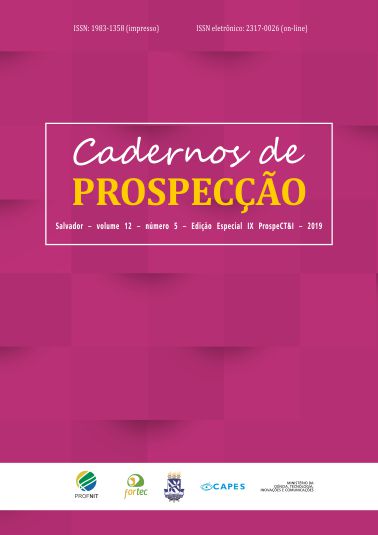Entrepreneurial Thinking, an Alternative to the Internalization of Entrepreneurship
DOI:
https://doi.org/10.9771/cp.v12i5.32930Keywords:
Entrepreneurship, Entrepreneurship teaching, Entrepreneural thinking.Abstract
The importance given to entrepreneurship today is unquestionable. It is related to the economy of the countries and the way society is structured. In Brazil, there are over fifty million people with their own businesses. With this theme as a basis, this article seeks to reflect on the issues brought by Jan Spruijt (2017) in his article "Paradoxes of Business Thinking: why entrepreneurship can hardly be taught" and suggest possible reflections or changes in the way universities which include entrepreneurship disciplines in their curricula and also to the Brazilian Micro and Small Business Support Service (SEBRAE) - especially for some of its educational actions – as its mission is: "To promote competitiveness and the sustainable development of small businesses and to foster the entrepreneurship to strengthen the national economy". The article was elaborated from an exploratory research of bibliographic and documentary basis, with an analytical approach, leading to the reflection of the lines of study that contribute to the understanding of Spruijt, models or practices for teaching entrepreneurship, paradoxes of entrepreneurial thinking and of entrepreneurship teaching practice.
Downloads
References
BACIGALUPO, Marguerita et al. EntreComp: the entrepreneurship competence framework. EUR – Scientific and Technical Research Reports. Publications Office of the European Union, 2016. Disponível em: https://ec.europa.eu/jrc/en/publication/eur-scientific-and-technical-research-reports/entrecomp-entrepreneurship-competence-framework. Acesso em: 28 ago. 2019.
BAGGIO, Adelar Francisco; BAGGIO, Daniel Knebel. Empreendedorismo: Conceitos e definições. Revista de Empreendedorismo, Inovação e Tecnologia, Passo Fundo, v. 1, n. 1, p. 25-38, jan. 2015. ISSN 2359-3539. Disponível em: https://seer.imed.edu.br/index.php/revistasi/article/view/612/522. Acesso em: 0 ago. 2019.
DORNELAS, José Carlos Assis. O processo empreendedor. In: DORNELAS, José Carlos Assis. Empreendedorismo: transformando ideias em negócios. 6. ed. São Paulo: Atlas, 2016. p. 7-37.
SEBRAE – SERVIÇO BRASILEIRO DE APOIO ÀS MICRO E PEQUENAS EMPRESAS. Página web do Empretec: fortaleça suas habilidades como empreendedor. [2019]. Disponível em: http://www.sebrae.com.br/sites/PortalSebrae/sebraeaz/empretec-fortaleca-suas-habilidades-como-empreendedor,db3c36627a963410VgnVCM1000003b74010aRCRD. Acesso em: 5 ago. 2019.
FINCODA – FRAMEWORK FOR INNOVATION COMPETENCIES DEVELOPMENT AND ASSESSMENT. O projeto FINCODA: 2015-2017. [2016]. Disponível em: https://www.fincoda.eu/. Acesso em: 28 ago. 2019.
ISENBERG, Daniel. Como é na realidade um ecossistema de empreendedorismo. 2017. Disponível em: http://hbrbr.uol.com.br/como-e-na-realidade-um-ecossistema-de-empreendedorismo/. Acesso em: 05 ago. 2019.
SPRUIJT, Jan. Paradoxes of Entrepreneurial Thinking: why entrepreneurship can hardly be taught. 2017. Disponível em: file:///C:/Users/patyc/Downloads/SSRN-id2969895.pdf. Acesso em: 6 ago. 2019.
Downloads
Published
How to Cite
Issue
Section
License
Copyright (c) 2020 Cadernos de Prospecção

This work is licensed under a Creative Commons Attribution-NonCommercial 4.0 International License.
O autor declara que: - Todos os autores foram nomeados. - Está submetendo o manuscrito com o consentimento dos outros autores. - Caso o trabalho submetido tiver sido contratado por algum empregador, tem o consentimento do referido empregador. - Os autores estão cientes de que é condição de publicação que os manuscritos submetidos a esta revista não tenham sido publicados anteriormente e não sejam submetidos ou publicados simultaneamente em outro periódico sem prévia autorização do Conselho Editorial. - Os autores concordam que o seu artigo ou parte dele possa ser distribuído e/ou reproduzido por qualquer forma, incluindo traduções, desde que sejam citados de modo completo esta revista e os autores do manuscrito. - Revista Cadernos de Prospecção está licenciado com uma Licença Creative Commons Attribution 4.0. Esta licença permite que outros remixem, adaptem e criem a partir do seu trabalho para fins não comerciais, e embora os novos trabalhos tenham de lhe atribuir o devido crédito e não possam ser usados para fins comerciais, os usuários não têm de licenciar esses trabalhos derivados sob os mesmos termos.
Este obra está licenciado com uma Licença Creative Commons Atribuição 4.0 Internacional.





